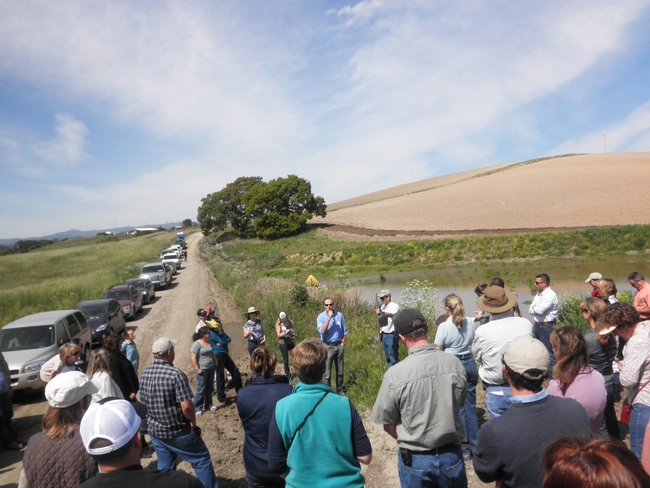Conservationists, growers, food safety experts discuss food safety, water quality
Conservationists, growers, food safety experts discuss food safety, water quality
Fresh produce growers are encouraged and sometimes required by law to protect soil and water quality on their farms as well as support wildlife populations by preserving their habitat. At the same time, growers must protect their crops from contamination by pathogens that can cause foodborne illnesses.
Strategies to ensure food safety while protecting natural resources was the subject of lively discussion among conservation and food safety professionals, auditors, federal and state agencies, environmental groups, scientists and members of the agricultural industry who gathered in Watsonville on Wednesday, April 18.
Achieving food safety and conservation objectives while maintaining a strong bottom line is extremely challenging for the produce industry at all levels of the supply chain.
Hank Giclas, senior vice president for strategic planning, science and technology at Western Growers said, "Despite the challenges, growers are committed to providing safe food while ensuring conservation of vital natural resources and these forums are important settings in which a free flow of ideas and experiences are exchanged to further both objectives."
The University of California Cooperative Extension, in collaboration with the Farm Food Safety and Conservation Network brought together 100 people for the fifth annual Food Safety and Water Quality Co-management Forum.
Those attending heard the latest information on existing and pending regulations and food safety guidelines that affect co-management and the most recent science of risk assessment. They also engaged in frank discussion of co-management challenges and solutions at all levels of the supply chain, from large company policies to field level practices of individual growers.
"Co-management requires networking among stakeholders to understand different types of risks in the produce industry," explained Mary Bianchi, UC Cooperative Extension advisor in San Luis Obispo and Santa Barbara counties.
Co-management takes into consideration that practices designed to conserve natural resources may impact food safety, and food safety practices may impact natural resources. For example, produce buyers often prefer bare ground around crops because they allow food safety managers to observe tracks indicating animal intrusion in the crop, but vegetation buffers may be more effective at reducing movement of pollutants to surface waters. A co-management approach might minimize the use of bare-ground buffers near waterways to reduce adverse impacts on water quality management. Food safety professionals with co-management savvy will also recognize that vegetated buffers between areas frequented by wildlife, such as rangeland, can minimize the movement of pathogens in surface waters flowing toward the crop, particularly on sloped terrain.
Bianchi, who helped organize the meeting, was pleased with the results of the event.
"We surveyed the participants before and after the forum," she said. "Before the forum, 27 percent of the participants said they felt they had adequate access to science-based information about co-management. After the forum, 55 percent of the participants felt they had access to science-based that would help them make decisions, and 79 percent of the participants felt that they could incorporate what they learned into the decisions they make."
A panel of industry leaders discussed the evolving food safety guidelines and policy, including the FDA Food Safety Modernization Act, the California Leafy Greens Marketing Agreement, and Good Agricultural Practices harmonization. The panel included Greg Komar, Growers Express director of food safety; Laura Giudici-Mills, owner of LGM Consulting; and Dave Runsten, Community Alliance with Family Farmers director of policy and programs; and Giclas of Western Growers.
Scientists led a discussion on the fate and transport of pathogens in the farm landscape and how science can be applied to assess risk and inform co-management decisions in the field. The scientific panel included Mark Ibekwe, USDA Agricultural Research Service microbiologist; Trevor Suslow, UC Cooperative Extension specialist in the Department of Plant Sciences at UC Davis; Michele Jay-Russell, Western Institute for Food Safety and Security program manager at UC Davis; Andy Gordus, California Department of Fish and Game environmental scientist; and Bianchi.
Following the panel discussions, participants visited an organic vegetable and berry farm near the Watsonville Sloughs. The landowner, growers and food safety professionals discussed how they manage for food safety and environmental quality.
"We had a very diverse group attending, which is what the goal of the Farm Food Safety and Conservation Network is, to bring together diverse stakeholders in the hopes of building collaborative relationships around the topic of co-management," said Komar of Growers Express. "This forum, in my opinion, was very successful at doing just that."
MEDIA CONTACTS:
Mary Bianchi, UC Cooperation Extension farm advisor, (805) 781-5949, mlbianchi@ucdavis.edu
Lisa Lurie, Monterey Bay National Marine Sanctuary, Farm Food Safety and Conservation Network Coordinator (831) 420-3662, lisa.lurie@noaa.gov

